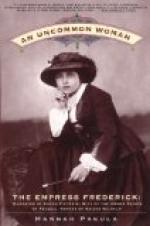“Signors,” said the chief cook, “it is on a beautiful and sublime affair that I have assembled you here to-day. It concerns an increase of the fame and triumphs we have so many times gained over our diplomatic rivals, and an increase of the laurels we have won in the sacred realms of our art! I propose to prepare a banquet for to-morrow, and for that I require your support and aid, gentlemen. For what is the use of ever so good a plan of battle of a commander-in-chief, if his troops fail in courage and skill to carry out the plan of their general? Gentlemen, I doubt not your courage or skill! You will contend for the sake of the fame we have acquired and hitherto enjoyed without dispute, for the sake of the fame which the French cuisine has enjoyed for centuries, and which must be preserved until the end of all things! You will stand by me, gentlemen, in the praiseworthy effort to acquire new glory for France, by showing these little Austrian princes and these gentlemen diplomatists what wonderful things the French art of cookery can bring to pass. The plan is devised and sketched, and all that is now required is its execution. If this great work succeeds, then, gentlemen, you may feel assured of my eternal gratitude—a gratitude which I will prove to you by leaving all the remains of the dinner to your free use and sole benefit! Here is the plan, hasten to the work; I have assigned to each one the part he is to take in its accomplishment. Hasten, therefore! I, however, by way of exception, will myself go to the market to-day and make the necessary purchases. On such an important occasion, no one, however highly placed, must decline labor and the faithful performance of duty. I go, therefore, and six of the kitchen-boys may follow me with their baskets.”
Thus speaking, the chief cook, Signor Gianettino, took his hat and gold-headed cane to go to the market. Six kitchen-boys, armed with large baskets, followed him at a respectful distance.
At the great vegetable and fish-market of Rome there was to-day a very unusual and extraordinary life and movement. There was a crowd and tumult, a roaring and screaming, a shouting and laughing, such as had not been heard for a long time. It was partly in consequence of the fact that the whole diplomatic corps had been for some days agitated with preparations for entertainments in honor of the Archduke Ferdinand, who had come to Rome to see the wonders of the holy city, and who could hardly find time and leisure for the festivities offered him. But for the tradesmen and dealers, for the country people in the vicinity of Rome, this presence of the Austrian prince was a happy circumstance; for these banquets and festivals scattered money among the people, and the dealers and honest country people could fearlessly raise their prices, as they were sure of a sale for their commodities. The cooks and servants of the diplomatists and cardinals were seen running hither and thither in busy haste, everywhere selecting the best, everywhere buying and cheapening.




